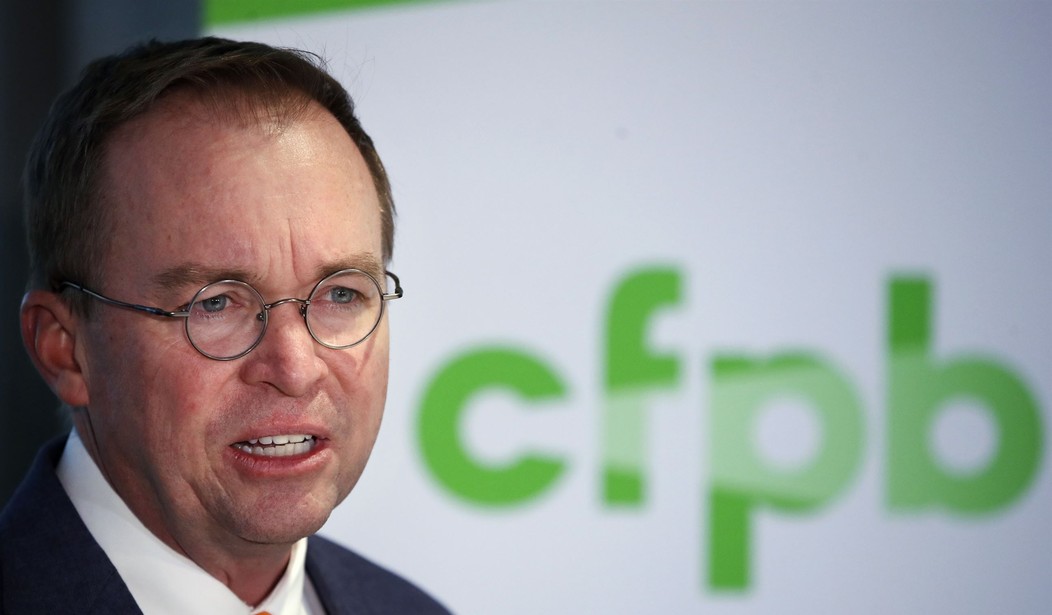Government agencies are hardly paragons of restraint and efficiency, but bureaucrats are at least held accountable by Congress - most of the time. Unfortunately, the Consumer Financial Protection Bureau (CFPB) operates without a leash from lawmakers and consumers and taxpayers pay the price every day. This sprawling bureaucracy, which runs diametrically counter to the ideas in the Constitution, exists wholly beyond the scope of checks and balances that keep other government agencies in line.
Its rules have proven onerous, and the CFPB has led to costlier financial services across the economy. Instead of further increasing this agency’s power, as lawmakers (and presidential candidates) such as Sen. Elizabeth Warren (D-MA) are trying to do, lawmakers should rein in the CFPB and save consumers and taxpayers from an onerous, unaccountable bureaucracy.
The CFPB has been able to skirt the rule of law repeatedly since its creation in 2011, getting its funding from the Federal Reserve instead of Congress. These funds are allocated solely at the Director’s request, destroying any sort of transparency and accountability that would normally be expected of a government agency. But where some rightly see a tragic overreach of government power, others see an opportunity to quickly and quietly fulfill an agenda of government regulation over financial services. The agency’s 2013 payday lending rule capped interest rates on small loans, advancing the Democrats’ crusade against “predatory” loans but reducing options for high-risk borrowers with few options to begin with.
It’s no wonder when Mick Mulvaney inherited the CFPB and went to work implementing necessary organizational changes to the Bureau, agency backers cried foul. Not long after Mulvaney was named Acting Director, the opposition activated a smear campaign to tarnish his career in public service and credibility.
The mismanagement of the CFPB, however, was not at the fault of Mulvaney. In fact, then-Acting Director made efforts to introduce order at the Bureau, after Former-Director Richard Cordray left behind a trail of abuse in leadership during his time in control. Cordray’s questionable Civil Penalty Fund, for instance, accumulated more than $300 million without any detail on how or when that money would be spent. Cordray put most of his effort into enforcement rather than promoting access to financial products and services that American families rely on
Recommended
Sen. Warren, and 43 other Senate Democrats, cared more about posturing than introducing accountability, sounding the alarm on President Trump’s pick of Mulvaney for Acting Director, and urging the President to pick someone who has a “track record for being tough on big banks and other financial firms that rip off consumers.” The reality is, if they want to have any control in who should lead such a powerful agency, then the scope of the Bureau’s independence should be reduced, something Mulvaney in fact urged Congress to do, and something current CFPB Director Kathy Kraninger has echoed.
While efforts prevail to tear down any Republican who leads the Bureau, Mulvaney’s track record is of notability. At the Office of Management and Budget, he restored organization and order amongst government programs, making him a good choice to jump in and get a grasp on the mismanagement of the CFPB. The American people called for less bureaucracy through the election of President Trump, and Mulvaney served his role as Acting Director of the CFPB by following the President’s Executive Order requiring all agencies to eliminate two regulations for every new regulation put into place. He led efforts to roll back the payday lending rule to restore access to alternative forms of credit for borrowers in desperate need of a second chance. He even gave taxpayers a break, having assessed the CFPB’s budgetary needs and requested absolutely zero funds for the second quarter of FY2018. These welcome efforts haven’t gone unnoticed - or unopposed - by the agency’s fact-challenged defenders.
Unfortunately, House Financial Services Committee Chairwoman Maxine Waters (D-CA) is still pushing for a Bureau with complete independence by codifying the foundational structure of the CFPB into law. In the midst of these efforts, it’s now up to Director Kraninger to guide the Bureau towards the right path and continue to lead the charge against an unaccountable rule-setting process that harms taxpayers and consumers.
Ross Marchand is the director of policy for the Taxpayers Protection Alliance.

























Join the conversation as a VIP Member